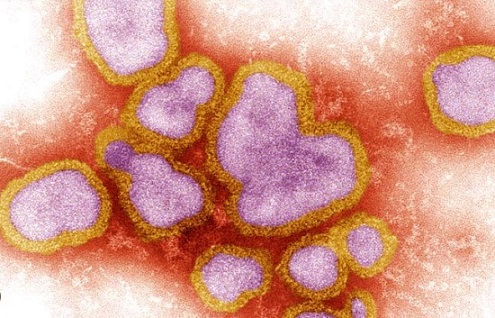Small protein PESP found to boost Influenza virus replication by enhancing autophagy
Nikhil Prasad Fact checked by:Thailand Medical News Team Aug 15, 2024 7 months, 4 weeks, 1 day, 1 hour, 16 minutes ago
Influenza News: A recent groundbreaking study from researchers at Fujian Agriculture and Forestry University, China, has uncovered a small but mighty player in the battle between the influenza A virus (IAV) and our immune system. The study, which sheds light on a previously unknown small protein, reveals how the virus cleverly manipulates our body's defenses to replicate and spread more effectively. This
Influenza News report delves into the fascinating discovery of a protein encoded by a long noncoding RNA (lncRNA) known as PCBP1-AS1, highlighting its pivotal role in enhancing the replication of the influenza virus through the process of autophagy.
 Small protein PESP found to boost Influenza virus replication by enhancing autophagy
The Discovery of PESP: A New Player in Influenza Virus Replication
Small protein PESP found to boost Influenza virus replication by enhancing autophagy
The Discovery of PESP: A New Player in Influenza Virus Replication
Researchers at Fujian Agriculture and Forestry University, alongside colleagues from the Chinese Academy of Sciences, embarked on a study to explore the functions of small proteins encoded by lncRNAs in viral infections. They identified a 110-amino acid protein, which they named PESP (PCBP1-AS1-encoded small protein). This protein, encoded by the lncRNA PCBP1-AS1, emerged as a significant regulator of influenza virus replication.
The study discovered how PESP was upregulated during IAV infection and how it enhances the virus's ability to replicate by promoting autophagy, a process that cells typically use to clear out damaged components. The study reveals that the influenza virus cleverly hijacks this process to its advantage.
How PESP Enhances Influenza Virus Replication
The study demonstrated that both the PCBP1-AS1 RNA and the PESP protein were significantly upregulated in response to influenza A virus infection. Researchers observed that overexpression of either PCBP1-AS1 or PESP led to a substantial increase in IAV replication. Conversely, when the expression of these molecules was reduced, the virus's ability to replicate was notably diminished.
A key finding of this study is that PESP enhances autophagy by increasing the levels of ATG7, an essential enzyme involved in the autophagy process. Autophagy, while typically a mechanism for maintaining cellular health, is co-opted by the influenza virus to facilitate its replication. The researchers found that the interaction between PESP and another protein, HSP90AA1, is crucial for the stability and function of PESP. This interaction further boosts autophagy, thereby increasing viral production.
The Role of Autophagy in Influenza Virus Infection
Autophagy is a cellular process where cells degrade and recycle their own components. Under normal circumstances, it is a defense mechanism against various pathogens, including viruses. However, some viruses, like IAV, have evolved to exploit this process to enhance their own replication.
In this study, researchers discovered that PESP plays a pivotal role in modulating autophagy to benefit the influenza virus. By upregulatin
g ATG7, PESP increases the formation of autophagosomes, which are cellular structures that the virus can use to facilitate its replication. This finding is significant because it uncovers a new target for potential antiviral therapies - by inhibiting PESP or its interaction with HSP90AA1, it might be possible to reduce the replication of the influenza virus.
Implications for Antiviral Research
The discovery of PESP and its role in influenza virus replication opens up new avenues for antiviral research. Understanding how the virus exploits autophagy through PESP could lead to the development of new therapeutic strategies aimed at disrupting this process.
For example, targeting the interaction between PESP and HSP90AA1 could be a novel approach to weakening the virus's ability to replicate. Additionally, finding ways to inhibit the upregulation of ATG7 or the function of PESP might also prove effective in reducing the impact of influenza infections.
Conclusion
The identification of PESP as a key regulator of influenza virus replication marks a significant advance in our understanding of the virus-host interaction. This small protein, encoded by the lncRNA PCBP1-AS1, plays a critical role in enhancing the replication of the influenza virus by modulating the autophagy process. By promoting the production of ATG7 and stabilizing its function through interaction with HSP90AA1, PESP ensures that the virus has the resources it needs to multiply within host cells.
The implications of this discovery are far-reaching, offering potential new targets for antiviral therapies that could one day improve our ability to combat influenza and other viral infections.
The study findings were published in the peer-reviewed journal PLOS Pathogens.
https://journals.plos.org/plospathogens/article?id=10.1371/journal.ppat.1012461
For the latest
Influenza News, keep on logging to Thailand Medical News.
Read Also:
https://www.thailandmedical.news/news/what-flu-strains-are-behind-the-alarming-surge-in-hospitalizations-in-queensland-australia
https://www.thailandmedical.news/news/soybean-extract-shows-promise-in-inhibiting-influenza-virus-entry
https://www.thailandmedical.news/news/inhibiting-ran-protein-could-be-key-to-stopping-influenza-a-virus
